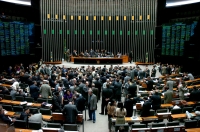
Anthony Pereira
Anthony Pereira graduated from the University of Sussex in 1982 with a BA in Politics and then in 1986 obtained an MA in Government from Harvard University.
His PhD dissertation at Harvard, defended in 1991, involved research on rural labour organisations in Northeast Brazil under two different periods, the late 1950s and early 1960s, and the late 1970s and 1980s. Rural labour organisations played an important role in the politics of both periods, and the dissertation drew on newspaper archives, qualitative interviews, government documents, and a survey of trade union leaders to analyse the changing nature and impact of that role.
After completing his PhD, Pereira taught at the Graduate Faculty of the New School for Social Research in New York City. In 1995, he was a visiting professor at Harvard University, and in 1997-9, a visiting professor at the Fletcher School of Law and Diplomacy at Tufts University in Boston.
In 1999 he moved to New Orleans, Louisiana, to take a position in the Department of Political Science at Tulane University. During this time he finished his second major research project, a comparative study of the Brazilian military regime’s legal treatment of opponents and dissidents. This study, drawing on court records and interviews, compared the Brazilian military regime (1964-85) to the military regimes in Argentina (1976-83) and Chile (1973-90).
Pereira’s current work concerns citizenship, human rights, public security, and state coercion in Brazil. This includes a study of the performance of a relatively new human rights institution, the police ombudsman, in two different states in Brazil, as well as an analysis of some recent efforts to reform the police. Pereira has been a member of the Executive Committee of the Brazilian Studies Association (BRASA) and is an occasional commentator for BBC Brasil.
Brazil's president faces criminal charges and 2% approval rating – but clings on
Jun 30, 2017 17:11 pm UTC| Politics Law
Brazils attorney-general, Rodrigo Janot, has charged the president, Michel Temer, with the crime of passive corruption more commonly known as accepting a bribe. The Supreme Court will now send the charge to congresss...

Brazil looks almost ungovernable – but it's more robust than it seems
Mar 09, 2016 00:05 am UTC| Insights & Views Politics
On Friday March 4, about 200 federal policemen and 30 tax auditors raided the apartment of former president Luiz Inácio Lula da Silva (Lula), who was taken to Congonhas airport for a three-hour interrogation while...
- Market Data









































